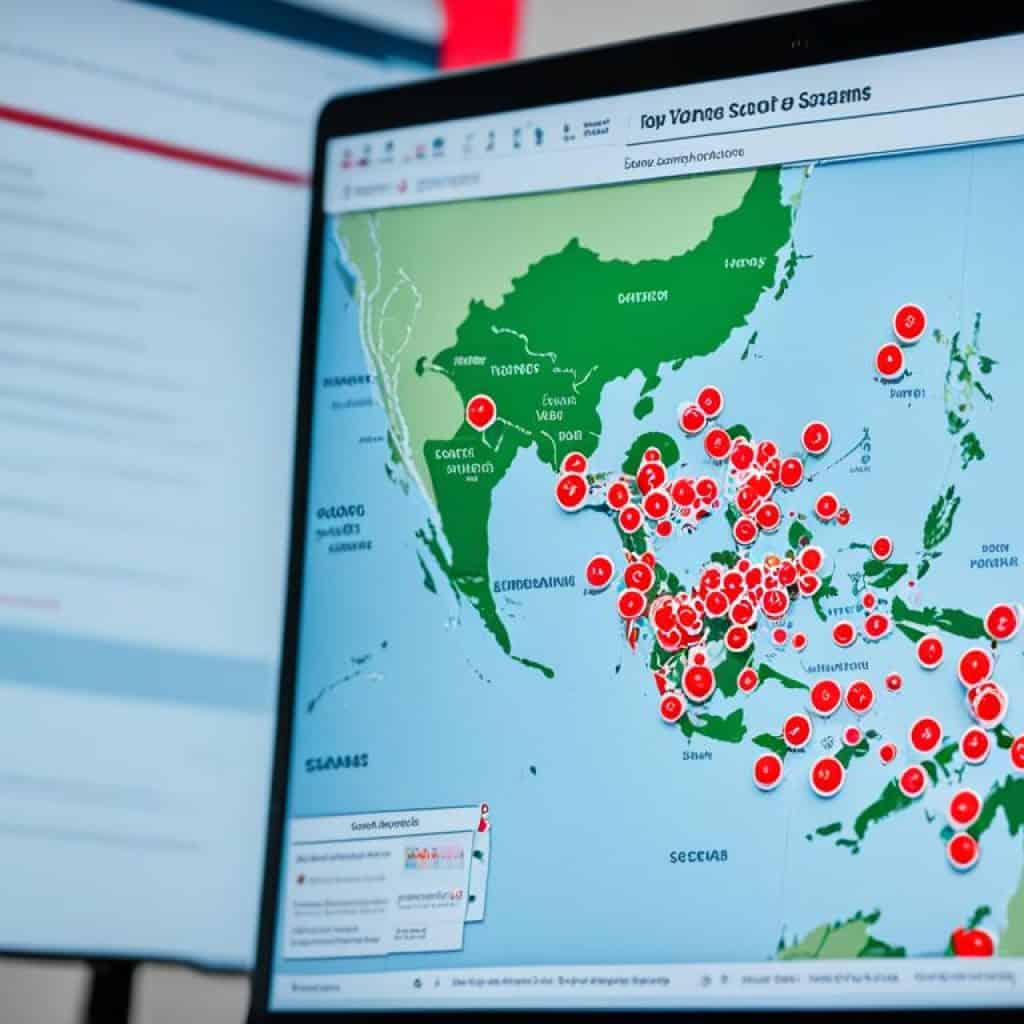Are you aware of the common scams that exist in the Philippines? Do you know how scammers manipulate innocent individuals with promises of prizes, loans, or even love? It’s time to stay vigilant and protect yourself from falling victim to Filipino scams.
In recent years, the prevalence of Filipino scams has been on the rise, with scammers using various tactics to deceive unsuspecting individuals. From phone and message scams to online schemes, these scams can have devastating effects on people’s finances and well-being.
Are you ready to outsmart the scammers and safeguard your hard-earned money? Let’s get started!
Key Takeaways:
- Filipino scams are on the rise, and it’s crucial to stay alert and informed.
- Common scams in the Philippines include phone and message scams, romance scams, and online fraud.
- Real estate and investment scams are significant concerns, especially for locals and foreigners.
- By following precautionary measures and reporting scams to the appropriate authorities, you can protect yourself.
- Be skeptical of any offers or requests for money and verify their authenticity before taking any action.
Types of Filipino Scams
In the Philippines, there are various types of scams that individuals need to be wary of. Scammers employ different techniques to deceive unsuspecting victims and exploit their trust. It is crucial to understand these scams and stay vigilant to protect yourself from becoming a victim. Let’s explore some common types of Filipino scams:
Phone and Message Scams
Phone and message scams are prevalent in the Philippines, where scammers try to trick victims into believing they have won a prize or have been approved for a loan. These scammers often ask for large fees through money transfers or local banks, preying on the victims’ desire for financial gain or assistance.
Voice Phishing Attempts
Another common scamming technique used by fraudsters is voice phishing. In this scam, scammers call victims and impersonate legitimate individuals or organizations to extract personal or financial information. These phone calls may seem urgent or official, convincing victims to share sensitive details without realizing the consequences.
Romance Scams
Romance scams have become increasingly popular in recent years, especially online. Scammers create fake profiles on dating websites or social media platforms, posing as officials or individuals seeking love. They gain victims’ trust, form emotional connections, and eventually manipulate them into sending money.
It is important to be aware of these different scamming techniques in the Philippines and exercise caution when dealing with unknown phone calls, messages, or online relationships. By staying informed and skeptical, you can protect yourself from falling victim to these scams and avoid the devastating consequences.
Online Scams in the Philippines
Online scams are widespread in the Philippines, with Filipino scam artists employing various deceptive techniques to exploit unsuspecting victims. These unscrupulous individuals create fake social media profiles and dating apps, preying on the vulnerability of those seeking love or companionship. They manipulate victims into developing romantic relationships and then ask for money, taking advantage of their emotions and trust.
Additionally, Filipino scam artists may pose as job offers or businesses, tricking people into divulging personal or financial information. They use sophisticated tactics to gain victims’ confidence and convince them that the opportunities or offers are genuine. However, these scammers have malicious intentions and aim to defraud unsuspecting individuals.
It is crucial for internet users to exercise caution when interacting with strangers online, especially in the Philippines where online scams are prevalent. One should always verify the authenticity of any offers or requests before sharing any sensitive information. By remaining vigilant and skeptical, individuals can protect themselves from falling victim to these online scams.
Remember: When interacting with individuals online, trust your instincts, be cautious of red flags, and never share personal or financial information without proper verification.
To further illustrate the extent of online scams in the Philippines, here is a table highlighting some common techniques employed by scam artists:
| Common Online Scam Techniques | Description |
|---|---|
| Fake Social Media Profiles | Scammers create fake profiles on social media platforms to establish trust and manipulate victims into sending money or sharing personal information. |
| Romance Scams | Scammers pose as potential romantic partners to emotionally manipulate and deceive victims into sending them money. |
| Job Offer Scams | Scammers post fake job offers online, tricking individuals into providing personal and financial information or paying upfront fees. |
Being aware of these techniques can help individuals recognize and avoid becoming victims of online scams in the Philippines.

Stay Safe Online
Protecting oneself from online scams is of utmost importance. Here are some tips to ensure online safety:
- Use strong, unique passwords for all online accounts.
- Avoid sharing personal or financial information with unknown individuals or on suspicious websites.
- Verify the authenticity of job offers or online opportunities before providing any sensitive information.
- Regularly update devices and software to protect against potential vulnerabilities.
- Use secure Wi-Fi connections when accessing personal or financial information.
By following these precautions and staying informed about the tactics employed by Filipino scam artists, individuals can better protect themselves from online scams in the Philippines.
Real Estate Scams in the Philippines
Real estate scams pose a significant threat in the Philippines, targeting both locals and foreigners. Scammers employ various tactics, such as fraudulent property listings or posing as fake real estate agents, to deceive unsuspecting victims. These scams often involve requesting upfront fees or deposits, ultimately resulting in financial losses for the victims.
To protect yourself from falling victim to real estate scams in the Philippines, it is crucial to remain cautious and take the necessary precautions. Here are some recommendations to follow:
- Thoroughly research the property and its ownership details before making any payments. Verify the authenticity of the property listing through multiple credible sources.
- Work with reputable real estate agents or companies with established track records. Check their credentials, licenses, and reviews from previous clients.
- Visit the property in person whenever possible to assess its condition and ensure it matches the description provided.
- Never make upfront payments or deposits without signing a legally binding contract. Insist on using a trusted escrow service to hold the funds until the transaction is completed.
- Be cautious of any high-pressure sales tactics or requests for immediate action. Take the time to carefully consider the transaction and seek advice from professionals if needed.
By adhering to these guidelines, you can significantly reduce the risk of falling victim to real estate scams in the Philippines. Remember, conducting thorough research, working with trusted professionals, and verifying the authenticity of property listings are essential steps to ensure a safe and secure real estate transaction.
Investment Scams in the Philippines
Investment scams are unfortunately rampant in the Philippines, targeting unsuspecting individuals with promises of high returns and financial prosperity. Scammers employ various tactics, including pyramid schemes, Ponzi schemes, and unregulated investment opportunities, to deceive their victims. It is crucial for potential investors to exercise utmost caution when considering investment opportunities and take steps to protect themselves from falling prey to these fraudulent schemes.
Pyramid schemes:
One common type of investment scam in the Philippines is the pyramid scheme. In this scheme, individuals are enticed to invest money with the promise of high returns, often through recruiting more participants into the scheme. However, the sustainability of pyramid schemes relies heavily on the constant recruitment of new investors, making it inherently flawed and destined to collapse. As a result, those at the top benefit while the majority of participants lose their hard-earned money.
Ponzi schemes:
Another form of investment scam prevalent in the Philippines is the Ponzi scheme. In a Ponzi scheme, scammers use funds from new investors to pay returns to existing investors, creating the illusion of profitable investments. These schemes typically require participants to recruit more investors, further perpetuating the cycle. Ultimately, the scheme collapses when there are no longer enough new investors to sustain the payouts, leaving the majority of participants in financial ruin.
Unregulated investment opportunities:
In addition to pyramid and Ponzi schemes, unregulated investment opportunities are also prevalent in the Philippines. Scammers may present enticing investment options that promise high returns without any oversight or regulation. Victims who invest their hard-earned money in these schemes often find themselves with no legal recourse or protection when the scam unravels.
To protect yourself from investment scams in the Philippines, it is crucial to adopt a skeptical mindset and conduct thorough research before investing your money. Here are some actions you can take:
- Research the investment opportunity: Scrutinize the legitimacy of the investment by conducting independent research. Look for official documentation, licenses, and regulatory approvals.
- Verify the company or individual: Check the background and reputation of the company or individual offering the investment opportunity. Seek recommendations from trusted sources and consult financial professionals.
- Be wary of high returns: If an investment opportunity promises unusually high returns with little to no risk, it is likely a scam. Remember, legitimate investments carry a certain level of risk.
- Avoid pressure or urgency: Scammers often use tactics of urgency to pressure individuals into making impulsive investment decisions. Take your time to thoroughly evaluate the opportunity and consult with trusted advisors if needed.
By exercising caution and staying informed, you can protect yourself from investment scams in the Philippines and make sound financial decisions.
Remember, it is always better to be safe than sorry when it comes to your hard-earned money.
Money Scams in the Philippines
Money scams pose a significant threat in the Philippines, targeting individuals and exploiting their financial vulnerabilities. Scammers employ various deceptive tactics, including fake lotteries, inheritance scams, and requests for financial assistance disguised as emergencies. It is crucial to approach any offers or requests for money with skepticism and take the necessary steps to verify their authenticity before providing any financial assistance.
Common Money Scams in the Philippines
Money scams in the Philippines can take on many forms, each designed to deceive unsuspecting individuals:
- Fake Lotteries: Scammers may contact victims, claiming that they have won a substantial sum of money in a lottery. To claim their winnings, victims are asked to pay a processing fee or provide personal information.
- Inheritance Scams: Scammers pretend to be lawyers or representatives of a deceased person, offering the victim a chance to inherit a substantial sum of money. They may request payment for processing fees or legal expenses.
- Emergency Assistance Scams: These scams play on victims’ compassion by posing as individuals in urgent need of financial assistance. Scammers may claim to be stranded, facing a medical emergency, or dealing with a similar situation that requires immediate financial support.
It is essential to exercise caution when encountering any of these scams and to verify the legitimacy of the claims before taking any action.
“Beware of scammers promising quick wealth or emergency situations that require immediate financial assistance. Always verify the authenticity of such claims before providing any money.”
How to Spot and Protect Yourself from Money Scams
Protecting yourself from money scams requires vigilance and awareness. Here are some tips to help you avoid falling victim:
- Be skeptical of unsolicited offers or requests for money.
- Do thorough research and verify the authenticity of any claims before providing financial assistance.
- Never share personal or financial information with unknown individuals or entities.
- Avoid making payments or transferring money to unfamiliar individuals or organizations.
- Report any suspected money scams to local authorities or consumer protection agencies.
By staying informed, skeptical, and cautious, you can safeguard yourself from becoming a victim of money scams in the Philippines.
How to Avoid Filipino Scams
To protect yourself from falling victim to Filipino scams, it is crucial to remain vigilant and take the following precautions:
- Be cautious of suspicious calls or messages: Scammers often use phone and message scams to deceive victims. If you receive unsolicited calls or messages offering prizes or loans, be skeptical and avoid sharing any personal or financial information.
- Never share personal or financial information with strangers online: Be wary of individuals you meet online requesting personal or financial details. Avoid sharing sensitive information unless you have verified the legitimacy of the person or the platform.
- Thoroughly research and verify any offers or requests: Before acting on any offers or requests, conduct thorough research to ensure their authenticity. Check for red flags, such as unrealistic promises or high-pressure tactics, and verify the credibility of individuals or organizations involved.
- Use secure payment methods: When making transactions online, use secure payment methods to safeguard your financial information. Avoid transferring money through unreliable platforms or using methods that lack proper authentication and encryption.
- Consult with trusted professionals or authorities: If you suspect you may be dealing with a scam, seek advice from trusted professionals or authorities. They can provide guidance and help verify the legitimacy of any suspicious activity or requests.
By staying informed, skeptical, and following these precautions, you can protect yourself from becoming a victim of Filipino scams.

Be Wary of False Promises
“If it sounds too good to be true, it probably is.”
– Anonymous
Guam Homeland Security's Warning
Guam Homeland Security is committed to ensuring the safety and security of its residents. In light of the growing concern surrounding Filipino scams, the agency has issued a warning to the community. It is crucial for all residents to stay alert and exercise caution to protect themselves from falling victim to these scams.
The agency has received reports of various scams in the Philippines, including phone and message scams, voice phishing attempts, and romance scams. Scammers often utilize deceptive tactics such as promising prizes or loans and requesting large fees through money transfers or local banks. They may also pose as different individuals seeking love during holidays, preying on individuals’ emotions.
It is imperative for the community to be skeptical of any suspicious calls or messages. Never provide personal or financial information to unknown sources online or over the phone. Remember to thoroughly research and verify any offers or requests before taking any further action.
“We urge all residents to be vigilant and report any scam attempts they encounter. By raising awareness and staying informed, we can work together to protect our community from the detrimental effects of Filipino scams.”
If you receive a suspicious call or message, report it to Guam Homeland Security or local law enforcement immediately. By reporting these scams, you can play a crucial role in preventing others from falling victim to fraudulent schemes.
Guam Homeland Security's Tips for Avoiding Filipino Scams:
- Be cautious of suspicious calls or messages.
- Never share personal or financial information with strangers online.
- Thoroughly research and verify any offers or requests before taking action.
- Use secure payment methods when conducting transactions.
- Consult with trusted professionals or authorities if you suspect a scam.
By following these tips and staying informed, you can protect yourself and your loved ones from the devastating effects of Filipino scams.
| Common Filipino Scams | Risks and Consequences |
|---|---|
| Phone and message scams | Victims can lose large sums of money by paying fees for promised prizes or loans. |
| Voice phishing attempts | Scammers may try to gather personal or financial information, putting victims at risk of identity theft or financial loss. |
| Romance scams | Individuals may suffer emotionally and financially after falling for fake identities and sending money to scammers. |
Stories from Scam Victims
Real-life experiences from Filipino scam victims highlight the devastating impact of falling prey to fraudulent schemes. These individuals, hailing from Guam and the Philippines, have bravely shared their encounters with scams, shining a light on the deceptive tactics employed by scammers.
“I received a call promising me a substantial cash prize, but they requested advance payment for processing fees. Despite my gut feeling that it might be a scam, I took a chance and sent the money. Unfortunately, it was a costly lesson,” said Maria Santos, a victim of a phone scam.
Others have shared their harrowing experiences with romance scams, where scammers pose as interested love interests to exploit victims emotionally and financially.
“I met someone online who claimed to be a military officer stationed overseas. We developed a deep connection, and he convinced me to wire him money for a sudden emergency. It was a heart-wrenching betrayal that drained both my emotions and my bank account,” shared Mark Rivera, a victim of a romance scam.
These personal stories serve as cautionary tales for others, emphasizing the importance of staying alert, skeptical, and informed. The victims highlight the significance of recognizing red flags and avoiding engagement with scammers. By sharing their experiences, they aim to empower others to protect themselves and their finances from falling victim to Filipino scams.

Further Case Studies: Notable Filipino Scam Victims
| Name | Scam Type | Loss Incurred |
|---|---|---|
| Jennifer Dela Cruz | Online Love Scam | $10,000 |
| Michael Santos | Real Estate Scam | $20,000 |
| Grace Ramirez | Investment Fraud | $50,000 |
Beware of Pyramid Schemes
Pyramid schemes have become a rampant issue in the Philippines, posing significant risks to unsuspecting individuals. These deceptive scams operate by enticing people with promises of high returns on their investments. However, their true nature lies in a cycle of recruitment, where participants are required to bring in more people to earn money.
It is vital to understand that pyramid schemes are illegal and unsustainable. While a select few may profit initially, the vast majority of participants ultimately lose their investments. This unethical practice preys on individuals’ desire for financial security and can result in devastating financial losses.
To protect yourself and others, it is crucial to exercise caution when considering any investment opportunities that resemble pyramid schemes. Be wary of any scheme that emphasizes recruitment rather than legitimate business activities or the sale of actual products or services. Remember, if something sounds too good to be true, it probably is.
Identifying Pyramid Schemes
Pyramid schemes can be identified through certain telltale signs. Here are some red flags to watch out for:
- High investment returns with minimal effort or risk
- Focus on recruitment and building a network of participants
- Lack of tangible products or services being offered
- Pressure to recruit new members quickly
- Complex compensation structures that are difficult to understand
If you come across an investment opportunity that exhibits these characteristics, it is vital to approach it with extreme caution. Take the time to research the company and its business model, and consult with a financial advisor or expert if needed.
Reporting Pyramid Scams
If you suspect that you have encountered a pyramid scheme, it is crucial to report it to the appropriate authorities. By doing so, you can help protect others from falling victim to these fraudulent practices. Contact local law enforcement, relevant government agencies, or consumer protection organizations to file a complaint and provide any evidence or information you may have.
Remember, reporting pyramid scams not only aids in the prevention of further harm but also contributes to the overall fight against fraud in the Philippines.
Identifying and Reporting Scams
Protecting yourself and others from scams requires the ability to identify the signs of fraudulent schemes and take appropriate action. By recognizing common red flags and reporting suspected scams, you can help prevent others from becoming victims. Here are some key points to keep in mind:
- Requests for money: Be wary of any individual or organization asking for money upfront or through unconventional methods. Scammers often use financial incentives to lure victims into their schemes.
- Unrealistic promises: Stay cautious of offers that sound too good to be true, such as guaranteed high returns on investments with little to no risk. Scammers often prey on people’s desire for quick and effortless financial gains.
- Pressure tactics: Scammers frequently employ high-pressure tactics to create a sense of urgency and manipulate victims into making hasty decisions. Be wary of anyone pressuring you to act immediately or without proper consideration.
- Requests for personal or financial information: Never share sensitive personal or financial information with unfamiliar individuals or organizations, especially if they approach you unexpectedly. Legitimate institutions do not request such information via unsolicited calls or messages.
If you suspect that you have encountered a scam, it is crucial to report it to the appropriate authorities immediately. Contact Guam Homeland Security, local law enforcement agencies, or organizations dedicated to tackling scams in your region. Reporting scams helps authorities take action against scammers and protect others from falling victim to similar schemes.
Remember, by staying informed, alert, and actively reporting scams, you can play a vital role in safeguarding yourself and your community from fraudulent activities.
Tips for Online Safety
To stay safe online and avoid scams, it is essential to follow these online safety tips:
- Use strong and unique passwords: Create passwords that are difficult for others to guess and avoid using the same password for multiple accounts. Consider using a password manager to securely store your passwords.
- Be cautious of sharing personal or financial information online: Avoid sharing sensitive information, such as your Social Security number or bank account details, unless you trust the website or service and are certain it is secure.
- Avoid suspicious websites or links: Be vigilant when browsing the internet and avoid clicking on suspicious links or visiting unverified websites. These can often contain malware or phishing attempts.
- Keep your devices and software up to date: Regularly update your devices, operating systems, and software to ensure you have the latest security patches and protections against vulnerabilities.
- Use secure Wi-Fi connections: When using public Wi-Fi networks, be cautious of transmitting sensitive information. Whenever possible, use a virtual private network (VPN) to encrypt your internet connection.
Remember, your online safety is in your hands. By following these tips, you can reduce the risk of falling victim to online scams and protect your personal information.
Conclusion
Filipino scams can have devastating consequences on individuals’ finances and overall well-being. However, by remaining vigilant, well-informed, and skeptical, individuals can protect themselves from falling victim to these fraudulent schemes.
It is crucial to exercise caution when receiving suspicious calls or messages, especially those promising prizes or seemingly attractive loan offers. It is important to verify the authenticity of any such offers or requests before providing any personal or financial information.
Additionally, it is essential to report any suspected scams to the appropriate authorities. By doing so, individuals can not only protect themselves but also help prevent others from becoming victims of these deceitful practices.
FAQ
What are some common scams in the Philippines?
Some common scams in the Philippines include phone and message scams, voice phishing attempts, romance scams, real estate scams, investment scams, and money scams.
How do scammers deceive victims in phone and message scams?
Scammers deceive victims in phone and message scams by promising prizes or loan approvals and then asking for large fees through money transfers or local banks.
What are romance scams?
Romance scams are when scammers pose as officials or individuals seeking love and manipulate victims into sending them money.
What techniques do scammers use in online scams in the Philippines?
Scammers use various techniques in online scams, such as creating fake social media profiles or dating apps to lure victims into romantic relationships and then asking for money.
How do real estate scams work in the Philippines?
Real estate scams in the Philippines often involve fraudulent property listings or fake real estate agents who ask for upfront fees or deposits.
What are investment scams in the Philippines?
Investment scams in the Philippines involve scammers promising high returns on investments and luring victims into fraudulent schemes, such as pyramid schemes or Ponzi schemes.
What are money scams in the Philippines?
Money scams in the Philippines can include fake lotteries, inheritance scams, or requests for financial assistance disguised as emergencies.
How can I avoid falling victim to Filipino scams?
To avoid falling victim to Filipino scams, it is important to be vigilant, cautious of suspicious calls or messages, never share personal or financial information with strangers online, thoroughly research and verify any offers or requests before taking action, and consult with trusted professionals or authorities if you suspect a scam.
What warnings have been issued by Guam Homeland Security about Filipino scams?
Guam Homeland Security has warned about various scams in the Philippines, urging residents to be alert and cautious, reporting any scam attempts, and seeking their assistance.
What stories have scam victims shared from Guam and the Philippines?
Scam victims have shared stories of receiving suspicious calls or messages, being deceived by promises of prizes or loans, and encountering romance scammers. They emphasize the importance of being aware of red flags and not engaging with scammers.
What are pyramid schemes and why should I beware of them?
Pyramid schemes are illegal and unsustainable schemes that involve recruiting individuals by promising high returns on investments. Participants are required to recruit more people to earn money, but only a few benefit, while the majority lose their investments.
How can I identify and report scams?
It is important to be able to identify the signs of scams, such as requests for money or personal information, promises of unrealistic returns, and pressure tactics. If you suspect a scam, report it to the appropriate authorities, such as Guam Homeland Security or local law enforcement.
What are some tips for online safety to avoid scams?
Some tips for online safety include using strong and unique passwords, being cautious of sharing personal or financial information online, avoiding suspicious websites or links, keeping devices and software up to date, and using secure Wi-Fi connections.







Add comment